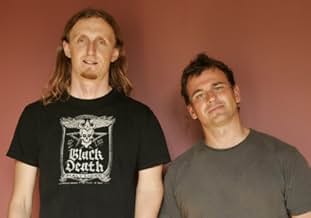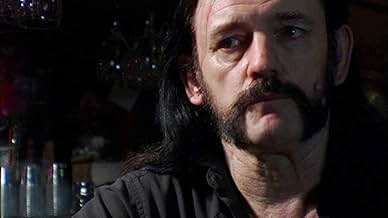Ajouter une intrigue dans votre langueAn examination of the heavy metal music subculture that tries to explain why, despite the longevity and popularity of the genre, fans are marginalized and ridiculed for their passion.An examination of the heavy metal music subculture that tries to explain why, despite the longevity and popularity of the genre, fans are marginalized and ridiculed for their passion.An examination of the heavy metal music subculture that tries to explain why, despite the longevity and popularity of the genre, fans are marginalized and ridiculed for their passion.
- Réalisation
- Scénario
- Casting principal
- Récompenses
- 1 victoire et 1 nomination au total
- Self
- (as Denis 'Piggy' D'Amour)
- Self
- (as Bob Ezrin)
- Self
- (as George 'Corpsegrinder' Fisher)
Avis à la une
I saw this movie at an outdoor summer screening in a local park, and it was brilliant to hear the sounds of the metal we know and love pounding out through the park on a Sunday night.
The film was a considered, thoughtful journey through some of the questions that plague the minds of those who aren't part of the metal community. Such as what the fans are like, how they get into metal, why they stay with metal and rarely stray from the various genres that it has. Others include sexuality, girls in metal, and so on.
Each aspect of the documentary was soundly explored, rationally argued, and balanced. For instance, on the one hand you get the perspective of groupies, and then of groupies from bands. You get differing opinions.
In fact, the documentary is a boon for both the metal community and the non-metal community alike. On the one hand, the mettles can revel in the exploration of their community and genres; on the other, the wider community can gain some real insight into the workings of the community.
I must admit that some of the humour that our (predominantly metal) audience felt at the posturing of the Norwegian Black Metal scene, and other parts, the rest of the audience didn't necessarily get. The humour is often something which you must be part of the community to understand, which is why it all appears so serious to the rest of society: they don't get the humour.
All in all, a well-wrought, skillfully crafted, and well argued documentary. Of course there were subgenres and things missing, but you get that with all docos - there just isn't the time to do it. Given the limitations, Metal: a headbanger's journey, makes the most of it and does it well.
Highly recommended viewing.
When this documentary starts showing at the multiplexes, it will be the biggest exposure this musical genre would have gotten thus far, aside from a few ridiculous lawsuits that went public throughout the years. The concept itself that mainstream audiences will be learning of everything from Dio's unique opinions on things to Norwegian Black Metal is quite appalling. More importantly, hopefully this documentary will clear once and for all every false doubt and misconception that Metal has always portrayed to the misinformed.
A head banger's journey starts off by examining Metal's roots, the long debate in regards to who was the first Metal band ever. Then, we are taken through an analysis of how metal sub-genres came to exist. Dunn also gives his thoughts about Metal's culture, viewpoints, religious standpoints, the fans and every other aspect of metal. Some of the veterans of the scene as well as some insightful outsiders give their interesting opinions to support the argument at hand. The film balances the serious aspects of Metal with some unintentional humor. Personalities like Alice Cooper, Bruce Dickinson, Alex Webster, Slipknot, Ghaal, Dee Snider, Doro, Ihsahn and many others offer their own individual thoughts in an intellectual way while bands like Mayhem make a fool out of themselves during a drunken interview.
Dunn is a true metal head. It is his passion, yet he gives a critical and sometimes subjective opinion of the music at hand. The documentary is extremely entertaining and informative. It made me proud to be a metal head. It even made me give bands I'm not too fond of another chance. Bottom line is, if you're a Metal fan you'll enjoy this from beginning to end. If you're a curious outsider, here's your chance to understand our world better and get a more defined opinion of our music. And even if you don't, well to quote Dunn at the end: "We're doing just fine without you "
But through him and his collaborators, he is able to get inside not just the off-shoots and specifics of the world of heavy-metal. The look, the style, the attitude, the controversies both domestic (i.e. Dee Snider's battle with Tipper Gore) and foreign (a superlatively done look at the Norwegian black-metal scene, which is both tense and hilarious), the women bands in the world, and how it helps some people really get better on with life either to hear it or play it or, of course, both. Dunn's look is good if, by necessity perhaps too, too brief, as he at one point lists a kind of heavy-metal family tree of sorts- all too quickly to really see every single one- and barely scratches the surface in the 96 minute running time. Maybe there is only so much that can be covered in a feature-length film, but the subject matter serves to be even more looked into; VH1 had also done a heavy-metal documentary, and it lasted four hours. On the other hand, Dunn and his people actually do get some material here that is more precious, and more enlightening. The juxtaposition of the 'true believers' and horrors in Norways black-death-metal scene with a band like Slayer, who are bad to the bone and have fans who go toe limit, is interesting.
It's the kind of documentary that really does work for that it's worth, but not enough of a good thing is explored for fans. Non-fans may get just enough that they can handle, a mix of the basic facts and key points (i.e. the coining of the term 'metal', the roots in the blues, the devil horns, and a look at outrageous album covers). It's good subjective film-making, though edging a little much on trying to get enough history along with the personal history.
This is no gushing fan-tribute. Well, it is in part, but I couldn't stay objective either were I given the chance to sit down with Bruce Dickinson at the Hammersmith Odeon. Seriously, it rises far above the fulfillment of a metal fan's dreams to explore many different elements of what makes metal both an enduring artform and one that remains on the fringes.
The structure of the film follows distinct topics - Gender, Censorship, Death & Violence, and more. Each area is thoughtfully explored with comments from many musicians and some outside observers. From the calm commentary of Rob Zombie to the wry humour of Dio to the laughable minimalist interviews with Norwegian black-metal players, there's a broad range of experiences and opinions.
This is an excellent documentary in every way.
I knew it was going to be great when I got my first glimpse of the big chart of metal bands that correctly put KISS far away from the actual musicians. Ronnie James Dio further obliged with a running commentary on Gene Simmon's preference for money over music.
You'll get to see and hear a lot of great bands, from the standard warhorses like Maiden, Metallica, Motorhead and Slayer to the less-mainstream stuff like Voivod.
The first few seconds into the film, when the all familiar intro of Number of the Beast began, with the clips of metal-heads on screen, I shivered, the hairs on the back of my neck standing up. I felt something very rare, I felt "I'm at home, baby!" \m/ I won't go ramble on about the things everyone knows. Yes, this film is awesome. It has that rare atmosphere, that only a true metal-head could create, like Sam Dunn. If you are a true rocker, you'll feel in sync with the guy, you'll know what he is talking about and why, but if you aren't into metal, you'll have a hard time understanding some of the meaning.
My biggest problem with this doc, is the same as the others: it's too superficial. For me, it's too much about satanism, gore and torching of churches. For me, metal is not about that. Metal is a form of expression, a way of life. I wanted to see more about metal from around the world.
For an anthropologist, Dunn is far too concerned about the different styles of back and death metal, rather than reviewing metal as a phenomenon and culture around the world. He focuses on the US and Norway, but that is just a little piece of the big picture. What about the rest of Europe? What about eastern metal or other regions of the world? What about the other genres of metal? I wanted to hear more about the different genres, the history and pioneers of each of them...etc, how those evolved and transformed over the years, and who are the artists that made it happen.
In a nutshell, it's too one-sided, too narrow perspective. I know it's only 90 minutes, but it could've been done. Okay, I'm maybe splitting hairs here. I agree, it's a decent documentary, and for such an (pardon the term) amateur team, it's a very good film about metal, but it left me with a nagging feeling of "something's missing", it's somehow not complete, and I guess that's what most people are feeling about this documentary. The interviews are very well done, but with the wrong people. I wanted to hear more big names, more name bands and real pioneers of metal. I know the film is very low-budget, and they probably couldn't pay for an interview with Ozzy, Lars, Joacim Cans or even Serj Tankian, but I really miss those bits from a documentary about metal. Other than that, its a pleasant experience, and I recommend it for every metal-head and non-metal-head out there.
Le saviez-vous
- AnecdotesIn one of the film's oft repeated moments, Dunn attempts to interview Mayhem's Necrobutcher at a festival, who clearly appears aggravated at the suggestion that black metal is not as popular as it once was. In 2015, Dunn would interview Necrobutcher again for his Metal Evolution series' "Extreme Metal" episode about the same subject, with a considerably more laid-back Necrobutcher admitting that Dunn's point about black metal being "fractured" to a more melodic and a rawer contingent is a valid one.
- GaffesDunn also mentions the "Filthy 15", a list of artists with lyrics considered obscene in one of a number of ways. Sam mentions that, of the 15, 8 are metal bands- he has miscounted. Upon reviewing the list, Danish black metal band Mercyful Fate make the list but bump the count to 9 bands. They are also not highlighted like the other metal bands sharing spots on the list.
- Citations
Sam Dunn: Ever since I was 12 years old I had to defend my love for heavy metal against those who say it's a less valid form of music. My answer now is that you either feel it or you don't. If metal doesn't give that overwhelming surge of power that make the hair stand up at the back of your neck, you might never get it, and you know what? That's okay, because judging by the 40,000 metalheads around me we're doing just fine without you.
- ConnexionsFeatures Heavy Metal Parking Lot (1986)
- Bandes originalesThe Number of the Beast
Written by Steve Harris (as Stephen Harris)
Performed by Iron Maiden
Licensed courtesy of EMI Records
Meilleurs choix
- How long is Metal: A Headbanger's Journey?Alimenté par Alexa
Détails
Box-office
- Budget
- 1 300 000 $US (estimé)
- Montant brut mondial
- 5 095 $US
- Durée1 heure 36 minutes
- Couleur
- Mixage
- Rapport de forme
- 1.85 : 1
Contribuer à cette page































